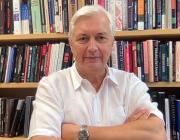Christopher Chyba majored in physics at Swarthmore College, where he was introduced to general relativity by John Boccio, and minored in mathematics and philosophy, with his senior thesis in political science. As a Marshall Scholar at Trinity College, Cambridge, Chyba did Part III of the Maths Tripos and an MPhil in the history and philosophy of science, with a thesis on the quantum measurement problem with Jeremy Butterfield. Chyba then did his PhD in planetary science and exobiology at Cornell University with Carl Sagan.
Chyba served on the staffs of the National Security Council and Office of Science and Technology Policy in President Clinton's first term, entering as a White House Fellow. Among other responsibilities, he chaired the interagency working group on emerging infectious diseases, then based on this group's work, was asked to draft the United States' first (1996) national response strategy for emerging infectious diseases.
After leaving the White House, Chyba became an assistant professor in the department of planetary sciences at the University of Arizona and was awarded a Presidential Early Career Award for Scientists and Engineers. He subsequently became an associate professor of geological sciences at Stanford University, while also holding the Sagan Chair at the SETI Institute and serving as Co-Director of Stanford's Center for International Security and Cooperation. In December 2001, he was asked to brief President Bush's national security and homeland security advisors on defense against bioterrorism. For a decade he served on the National Academy of Sciences (NAS) Committee on International Security and Arms Control (CISAC). He later chaired the NAS' Commitee on Preventing the Forward Contamination of Mars and the Science Definitiion Team for NASA's planned Europa Orbiter mission. In 2001, Chyba was named a MacArthur Fellow for his work in both planetary science and international security.
In 2004, Chyba became professor of astrophysical sciences and international affairs at Princeton University, where he holds a joint appointment in the Department of Astrophysical Sciences and in the School of Public and International Affairs (SPIA). At SPIA, he has been faculty director of the PhD program in security studies. In 2009, he served on the Review of U.S. Human Spaceflight Plans Committee, and from 2009 to 2016, he served on President Obama's Council of Advisors on Science and Technology (PCAST), for which he co-chaired the working groups on antibiotic resistance and biodefense. In late 2020 to early 2021, Chyba served on the national security and foreign policy team for the Biden-Harris transition. For two years he co-chaired a project of the American Academy of Arts and Sciences on "Meeting the Challenges of the New Nuclear Age", and served as a member of the OPCAST pandemic response group from March to November 2020. In January 2023, Chyba joined the national security division of the White House Office of Science and Technology Policy as a consultant special government employee. In April 2023, he was named the Dwight D. Eisenhower Professor in International Affairs and professor of astrophysical sciences.
Contact
Office: 122 Peyton Hall
Phone: 609-258-5633
E-mail: cchyba at princeton edu
Assistant: Geralyn Z. McDermott

